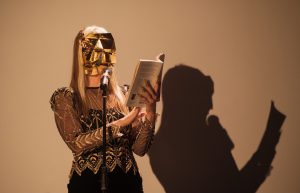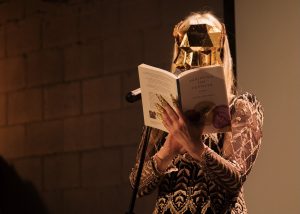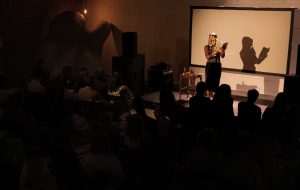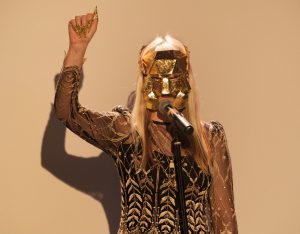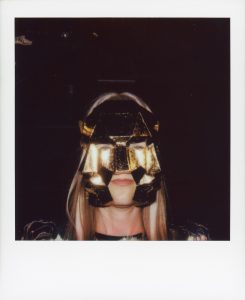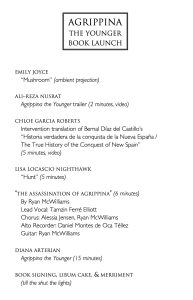
| BOOK TOUR INFO! |
She was a beloved eldest daughter in a golden political family, destined for greatness. She gave birth to a future emperor but hungered for more power than women are allowed—so she poisoned her husbands and exiled her enemies. The chronicles say that through sex, murder, and manipulation, Agrippina became Empress of Rome and used men as prosthetics to rule one of the largest empires in history. Exhausted by the misogyny of today, Arterian reaches into the past to try to understand how we got here. This manuscript was a finalist for the Tupelo Press Dorset Prize, and received an Honorable Mention from Claudia Rankine for the AWP Donald Hall Prize.
Praise
⟣ On Electric Lit’s “Best Poetry Collections of 2025”
⟣ A Ms. Best Poetry Collection
⟣ A NewPages Editor’s Choice
⟣ Featured on Lit Hub‘s “Poetry Books to Read This June”
⟣ Featured on Poetry Northwest‘s “Favorites: Summer 2025”
⟣ Featured on Write or Die‘s “Books We Can’t Wait to Read”
Diana Arterian was my classmate. She was a year above me, rightly so, and whenever she spoke, my understanding expanded. I grew, my mind unlocked, I began to comprehend the world and art more intimately. With Agrippina the Younger, with both its elegance and courage to embrace the history of our darkness—and with such aesthetic muscularity—I am learning from her still. By stepping toward, instead of running from the ancient histories of women-hatred, Arterian, somehow, excavates these legacies with a language and lyricism that holds our horror and beauty in sublime balance. “She does not look away…” — Robin Coste Lewis
In exquisitely braided prose and verse, Diana Arterian gives us an enthralling study of the often maligned and more often overlooked Agrippina the Younger. “I learn what survives best is buried,” Arterian insightfully tells us. “What is buried continues to surface.” But more than excavating history, Arterian presents us with a poet’s approach to history—one that is embodied, sensorial, and always conscious of form: “So I found myself pausing over these vessels of death.” Necessarily suspicious and critical of official narratives, Arterian dares to “pluck the thread” of time-worn accounts passed down to us from patriarchy. In this stunningly lyrical book—rigorously researched and rigorously imagined—we hear history as lies but also lyre: an instrument, in Arterian’s hands, attentively tuned and pitch perfect with song. — Brandon Som
In Arterian’s vision, women have ferocious agency. This is the reclamation of a woman overlooked alongside documentation of the author’s own obsessively searching for Agrippina, which is itself a mirror portrait of a contemporary woman reaching across centuries. This feminist collection is both a timeline and a map. — Diana Khoi Nguyen, BOMB
Arterian is a fine storyteller, moving the reader deftly between Agrippina’s real and imagined histories and the poet’s present-day search for her. The book is cleverly paced, arranged so that Arterian’s quests seem to reveal Agrippina’s secrets. Before long, I felt infected with the loving obsession that drove the writing of this book…[H]istory and the dead demand our time, rage, ambition, and attention, and this is ultimately the voice that Agrippina the Younger amplifies with fury and grace. — Emily Van Duyne, Los Angeles Review of Books
Arterian’s poems imagine lost moments from Agrippina’s life, offer prose snippets of the immersive research process, and meditate on the elusive nature of power. — Electric Lit
A moving extended meditation on how we attempt to understand our relationship to the historical past. Arterian offers the reader an echo of the explorations that have come before, the complexities, paradoxes, and inadequacies of “making do” with the history we have. — Mary-Kim Arnold
[T]he book’s sparks fly in the flinty friction…between verse and prose. — Christopher Spaide, Lit Hub
Poet Dionne Brand says “the salvage is the life which exceeds the wreck” and Diana Arterian’s work seems animated by this work of salvage and recovery…she dives deep into the wreck and somehow resurfaces to re-present these lives, this art, shimmering with life, for us. — David Naimon, Between the Covers
The grand and beguiling collection both receives and resists the epic stylistic as it traces Agrippina as person, figure, and remainder. With curious devotion and meticulous line breaks, the conditions of her time and the poet’s overlap and the story of erasure comes alive…No detail is wasted in Arterian’s eye. — Nanya Jhingran & Cindy Juyoung Ok, Poetry Northwest
[Arterian] exhumes hidden details, creating a bridge through history to understand patriarchy and power. — NewPages
Et cetera
| Reviews |
⟣ At Los Angeles Review of Books by Emily Van Duyne
| Prose/Essays on Agrippina |
⟣ “Power, Motherhood & Murder: On the Life and Death of Agrippina the Younger,” Lit Hub
⟣ “My Roman Empire: Claudia Octavia,” Northwestern University Press’ Incidental Noyes blog
⟣ “10 Books About History’s Infinite, Unsung Legacies,” Electric Literature
| Conversations/Interviews |
⟣ David Naimon interview on Between the Covers podcast (transcript here, books we spoke about are here)
⟣ Diana Khoi Nguyen interview at BOMB
⟣ The enjambments series at the Academy of American Poets
⟣ Ruth Madievsky at The Creative Independent
⟣ Tiffany Troy interview at Tupelo Quarterly
⟣ PoetryNow Podcast at The Poetry Foundation
⟣ The People Podcast with Robin Coste Lewis
| Book Launch |
[Photos by Patrick Susmilch — can view event here]
| Poems |
The Academy of American Poets
Black Warrior Review
BOMB
Georgia Review
Harvard Review
Los Angeles Review of Books
The Poetry Foundation
Salt Hill


